The University is developing its international profile rapidly through its varied relationships with global partners and new and exciting inititatives. These are just some of our recent developments.
Birmingham medical professor becomes honorary citizen of Chinese city
The government of Guangzhou, one of the most important cities in mainland China, has named University of Birmingham Professor KK Cheng as an honorary citizen.
The prestigious honour was bestowed by Mr Wan Qingliang, Party Secretary of the CPC Guangzhou and Mr Chen Jianhua, Mayor of Guangzhou at an official ceremony in the city in December 2012.
Professor Cheng has a longstanding and active relationship with Guangzhou and has led the University’s academic interests in its most significant engagement in China to date - The University of Birmingham Guangzhou Centre, a landmark partnership between the University and the Guangzhou Municipal Government.
For over 10 years, Professor Cheng has been at the forefront of a pioneering public health project in Guangzhou. The Guangzhou Biobank Cohort Study (GBCS) is a collaborative research project between the Guangzhou Number 12 People's Hospital and the Universities of Birmingham and Hong Kong, which is following up 30,000 men and women over 50 in Guangzhou.
This project is recognised internationally as an important platform that supports research on the role of genetic, lifestyle, occupational, environmental and life course factors in common chronic diseases.
You can read more on this story is available on our news page.
Chinese Embassy visitors welcomed to the University
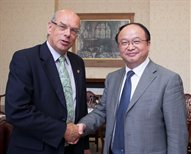 In August the University of Birmingham hosted Counsellor Shen Yang and three other representatives from the Education section at the Chinese Embassy.
In August the University of Birmingham hosted Counsellor Shen Yang and three other representatives from the Education section at the Chinese Embassy.
The Embassy visit to Birmingham highlights growing civic and academic ties with China. It was an opportunity for representatives to meet the Vice Chancellor and other senior University staff and to discuss the development of the University’s relationships with academic, government and commercial organisations in China.
The University has enjoyed a long history of engagement with China dating back over 100 years and last year saw the establishment of the University of Birmingham Centre in Guangzhou, Birmingham’s sister city, to support its emerging activities and collaboration in the region. The University’s engagement in Guangzhou focuses primarily on research collaboration in areas of strategic importance, such as health care, neurosciences and the environment and is supported by close relations with Guangzhou Municipal Government.
Recognising the University’s growing academic interests in China, the University is set to launch a China Institute in the autumn as an umbrella structure for the various China interests on the University’s Edgbaston campus. The visit provided an opportunity to share plans around the new Institute.
The visit to the University included a meeting with Vice-Chancellor Professor David Eastwood, Professor Edward Peck, Pro-Vice-Chancellor and Head of the College of Social Sciences (and Academic Lead for China); and Andréa Edwards, Director of International Development and Mobility. A working lunch provided opportunity for leading Birmingham academics to discuss their contribution to the development of the University’s relationships in China and the University’s China Institute. The visit also included an opportunity for Embassy staff to meet with Chinese students studying at Birmingham.
South Korean Ambassador welcomed on campus
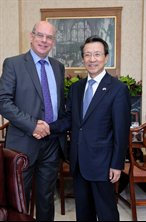 The University of Birmingham hosted Choo Kyu-Ho, the Republic of Korea’s Ambassador to the United Kingdom, on 17 July 2012 at the Edgbaston campus.
The University of Birmingham hosted Choo Kyu-Ho, the Republic of Korea’s Ambassador to the United Kingdom, on 17 July 2012 at the Edgbaston campus.
The Ambassador’s visit to Birmingham highlights growing civic and academic ties with South Korea. It was an opportunity for the Ambassador to meet staff and Korean students who are involved in the University of Birmingham’s MA in Policy into Practice, as well as senior University representatives.
The University has a long-standing agreement with the Korean government to enable Korean mid-career government officers to undertake professional training at the University. In strengthening these links, the University plans to incorporate a work placement programme enabling future students to gain a unique experience of UK local government, in a formal agreement with Birmingham City Council.
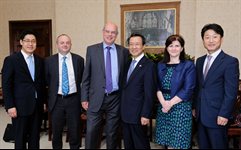 The visit included a meeting with Vice-Chancellor Professor David Eastwood, Professor Edward Peck, Pro-Vice-Chancellor and Head of the College of Social Sciences, and Andréa Edwards, Director of International Development and Mobility. Accompanying Ambassador Choo was Oh Byoung-Kwon, Counsellor from the Political Section of the Korean Embassy and Lee Ho-Hyeon, First Secretary from the Economic Section.
The visit included a meeting with Vice-Chancellor Professor David Eastwood, Professor Edward Peck, Pro-Vice-Chancellor and Head of the College of Social Sciences, and Andréa Edwards, Director of International Development and Mobility. Accompanying Ambassador Choo was Oh Byoung-Kwon, Counsellor from the Political Section of the Korean Embassy and Lee Ho-Hyeon, First Secretary from the Economic Section.
Andréa Edwards, Director of International Development and Mobility, at the University of Birmingham, said: “We are delighted to welcome His Excellency Ambassador Choo to the University of Birmingham. We believe the visit serves to highlight the emerging strength of relations between the University and the Republic of Korea. The University is one of the most popular UK universities for students from Korea and we are pleased to be able to continue to provide training for civil servants from Seoul on our MA Policy into Practice Programme, supporting them in developing a global perspective as they progress in their careers.”
High Commissioner receives honorary degree
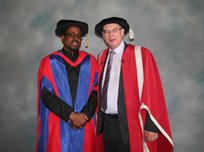 The High Commissioner of St Kitts and Nevis Mr Kevin M. Isaac was presented with an honorary degree at the University of Birmingham graduation ceremony on 12 July 2012.
The High Commissioner of St Kitts and Nevis Mr Kevin M. Isaac was presented with an honorary degree at the University of Birmingham graduation ceremony on 12 July 2012.
His Excellency Mr Kevin M. Isaac has had an extensive career as a diplomat. He is the youngest and first career diplomat of the Federation of St Kitts and Nevis to be elevated to the rank of High Commissioner/Ambassador. He is a graduate of the Universities of Toulouse-Mirail, West Indies, Birmingham and Warwick. He is the St Kitts and Nevis Permanent Representative to the International Maritime Organisation, and Governor on the Board of the Commonwealth Secretariat. High Commissioner Isaac is also a published poet.
Bioenergy workshop in São Paulo
 Researchers from the University of Birmingham are creating clean hydrogen from food waste, paving the way for a bioenergy alternative for the future.
Researchers from the University of Birmingham are creating clean hydrogen from food waste, paving the way for a bioenergy alternative for the future.
Currently, Brazil is the world’s most intensive user of bioethanol as an alternative to gasoline for powering transport. There are questions about whether the mass production of bioethanol using sugarcane is sustainable in the long-term. Bioethanol generates carbon dioxide and agricultural waste. However, creating clean hydrogen from waste not only uses that waste but provides a fuel that is emission free and can also be generated sustainably.
Presenting this research at a collaborative bioenergy workshop in São Paulo on 14 May 2012, Professor Lynne Macaskie, Professor of Applied Microbiology at the University of Birmingham, said “Fuel cells need clean energy to run them. If you provide bacteria with a supply of sugary waste from, for example, chocolate production, the bacteria can produce hydrogen. At the moment manufacturers pay to dispose of waste but with our technique they could convert it to clean electricity instead.”
“Bioethanol is the current biofuel of choice in Brazil but our research shows the huge potential for biohydrogen to be the fuel for the future. Biohydrogen could even be made from the wastes from bioethanol production - two biofuels for the price of one. More work from focused teams, however, is needed, as agricultural wastes are tougher for bacteria to digest.”
Organised jointly by the University of Birmingham and the University of Nottingham with O Conselho de Reitores das Universidades Estaduais de São Paulo (CRUESP) and the FAPESP bioenergy programme (FAPESP-BIOEN), the workshop took place in the State of São Paulo. Participants came from the University of Birmingham, the University of Nottingham, the State University of Campinas (UNICAMP), the University of São Paulo and São Paulo State University (UNESP).
Cultural Engagement Symposium in Chicago
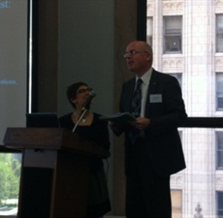 On Tuesday 8 May 2012 the University of Birmingham co-hosted a cultural engagement symposium in Chicago with the Commissioner of the City of Chicago’s Department of Cultural Affairs and Special Events, the University of Chicago, Chicago Sister Cities International, and the National Public Housing Museum.
On Tuesday 8 May 2012 the University of Birmingham co-hosted a cultural engagement symposium in Chicago with the Commissioner of the City of Chicago’s Department of Cultural Affairs and Special Events, the University of Chicago, Chicago Sister Cities International, and the National Public Housing Museum.
Entitled Local and Global Cultural Engagement: Connecting Cities, Universities and International Partners, the purpose of the sister city symposium was to identify best practice for cross-sector partnerships between cultural institutions and academia, and explore the potentially dynamic relationship between local and global cultural engagement agendas.
The Commissioner of the City of Chicago’s Department of Cultural Affairs and Special Events, Michelle T. Boone, opened the event at the Chicago Cultural Center. The programme included a session on university cultural engagement, led by Professor Larry Norman, Deputy Provost for the Arts at the University of Chicago, and his counterpart Professor Ian Grosvenor, Deputy Pro-Vice Chancellor for Cultural Engagement at the University of Birmingham.
Brian Bannon, Chicago Public Library Commissioner, and Brian Gambles, Chief Executive at the Library of Birmingham Development Trust and Assistant Director for Culture, Birmingham City Council, delivered a thought-provoking session on the future of public libraries and cultural learning. Marilyn Halperin, Director of Education and Communications at the Chicago Shakespeare Theater, and Professor Michael Dobson, Director of the University of Birmingham’s Shakespeare Institute, staged a well-received double-act on the legacy of the playwright in both the Midlands and in the US Midwest. Other sessions covered cultural heritage: cross-sector collaborative research and new technologies; and arts partnerships through creative curatorial practice. A networking reception hosted by British Consul General, Robert Chatterton Dickson, concluded the day.
The University of Birmingham delegation had the opportunity to meet representatives from the team charged with writing the 'cultural plan' for the city of Chicago. On behalf of Commissioner Boone, Dr Richard Clay, Co-director of the Heritage and Cultural Learning Hub at the University of Birmingham, and Professor Ian Grosvenor have subsequently been invited to contribute to a videoconferencing 'Global Forum’, entitled 'Ideas, Innovation, and Industry: A Conversation on Chicago's Future' on 30 May 2012.
The Chicago team were particularly taken by the Hub's description of 'triple helix' research collaborations that involve academics, Galleries, Libraries, Archives & Museums (GLAMs), and SMEs in the development of digital solutions. During the visit, the delegation found remarkably little evidence of 'triple helix' work in Chicago, however, found considerable interest in this model that is increasingly championed in some EU discourses.